Sanjuro 4K Blu-ray Movie
HomeSanjuro 4K Blu-ray Movie 
椿三十郎 / 4K Ultra HD + Blu-rayCriterion | 1962 | 96 min | Not rated | No Release Date
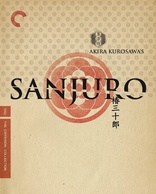
Price
Movie rating
8 | / 10 |
Blu-ray rating
| Users | 0.0 | |
| Reviewer | 4.5 | |
| Overall | 4.5 |
Overview
Sanjuro 4K (1962)
Jaded samurai Sanjuro helps an idealistic group of young warriors weed out their clan's evil influences, and in the process turns their image of a "proper" samurai on its ear.
Starring: Toshir˘ Mifune, Tatsuya Nakadai, Keiju Kobayashi, Yűz˘ Kayama, Reiko DanDirector: Akira Kurosawa
| Foreign | Uncertain |
| Drama | Uncertain |
| Period | Uncertain |
| Martial arts | Uncertain |
| Crime | Uncertain |
| Thriller | Uncertain |
| Action | Uncertain |
Specifications
Video
Video codec: HEVC / H.265
Video resolution: 4K (2160p)
Aspect ratio: 2.39:1
Original aspect ratio: 2.35:1
Audio
Japanese: LPCM Mono (48kHz, 24-bit)
Japanese: DTS-HD Master Audio 3.0
Subtitles
English
Discs
Blu-ray Disc
Two-disc set (2 BDs)
4K Ultra HD
Playback
Region A (locked)
Review
Rating summary
| Movie | 4.0 | |
| Video | 4.0 | |
| Audio | 4.5 | |
| Extras | 3.0 | |
| Overall | 4.5 |
Sanjuro 4K Blu-ray Movie Review
Reviewed by Dr. Svet Atanasov December 16, 2024Akira Kurosawa's "Sanjuro" (1962) arrives on 4K Blu-ray courtesy of Criterion. The supplemental features on the release include archival audio commentary by film historian Stephen Prince; archival documentary; theatrical trailer; and more. In Japanese, with optional English subtitles. Region-Free.
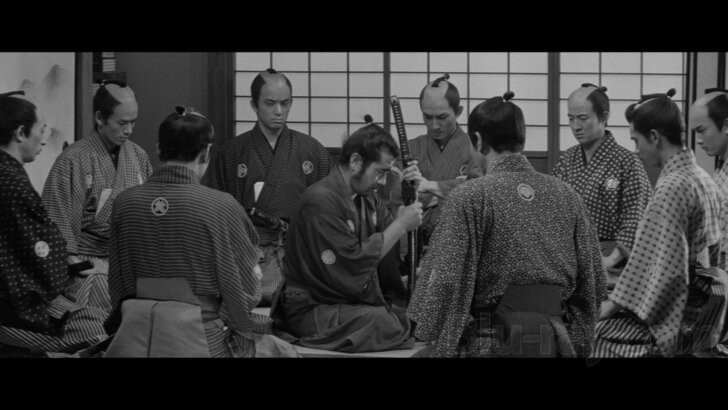
Note: The text below was initially used for our review of Criterion's first release of Sanjuro in 2010.
After the unprecedented success of Yojimbo at the box office in Japan, Toho approached Akira Kurosawa with a request for a sequel. Initially, the film was going to be an adaptation of a novel by Shugoro Yamamoto titled Peaceful Days and featuring a not so skillful with his sword samurai named Hirano, but Kurosawa rewrote the script and brought back the charismatic Sanjuro. Toshiro Mifune was again asked to play Sanjuro, though this time around his last name was changed from Kuwabatake to Tsubaki.
In the original script, Hirano was placed in the middle of an internal battle for power at his clan. Also, he was only to react to the turbulent events around him, not direct them. In the new script, Kurosawa made Sanjuro a confident man, well aware of his opponentsĺ moves. And as it was the case in Yojimbo, Sanjuro was again very impressive with his sword.
But there are some key differences between Yojimbo and Sanjuro. In Yojimbo, all of the drama takes place in a godforsaken small town that has essentially collapsed because of the battle for dominance between two rivaling gangs. When Sanjuro appears, the damage is already done and the only thing he could do is punish those who are responsible for it.
In Sanjuro, the drama and its progression are different. In and around the shrine where most of the film takes place, there is a sense of order that is completely missing in Yojimbo. Here, respect and loyalty still mean something. The men Sanjuro fights are also as noble as he is.
This is not to say, however, that Kurosawa is not as critical in Sanjuro as he is in Yojimbo. While Sanjuro is the quieter and more intimate of the two films, and a lot of the humor in it is far more straightforward, Kurosawaĺs jabs at traditionalism are at times far more effective. For example, some of the most entertaining sequences feature young warriors who are scolded for their blind loyalty and readiness to sacrifice their lives in the name of questionable ideals.
Kurosawa films Sanjuro differently, too. In Yojimbo he is a man that exudes power and respect, even when he makes it perfectly clear that money is what makes him happy. In Sanjuro, he is smarter than his opponents, but his presence is not as commanding. At times, Kurosawa even makes him look foolish. In a key sequence, for instance, Sanjuro loses a small argument with the wife of the man he is trying to save -- discussing camellias of all things -- and Kurosawa uses his embarrassment to make it clear that no one is perfect.
Yojimbo and Sanjuro are equally great looking films, though in different ways. Yojimbo has some remarkable panoramic vistas radiating a strong epic feel. It is also the more modern, at least as far as the then-current state of Japanese cinema is concerned, looking film. Sanjuro has a more traditional look, even though it retains many of the same tightly framed shots Kurosawa favored in Yojimbo.
Like Yojimbo, Sanjuro also benefits from a dynamic music score courtesy of legendary composer Masaru Sato. The score continuously blends traditional Japanese themes and colorful jazz harmonies. (Many of Seijun Suzuki's crime films do the same but with a notably greater enthusiasm to create and maintain their desired atmosphere).
In 2007, Japanese director Yoshimitsu Morita did a remake of Kurosawaĺs Sanjuro, but the film failed to impress the critics and was greeted with a healthy dose of disdain by fans of the original samurai film.
Sanjuro 4K Blu-ray Movie, Video Quality 
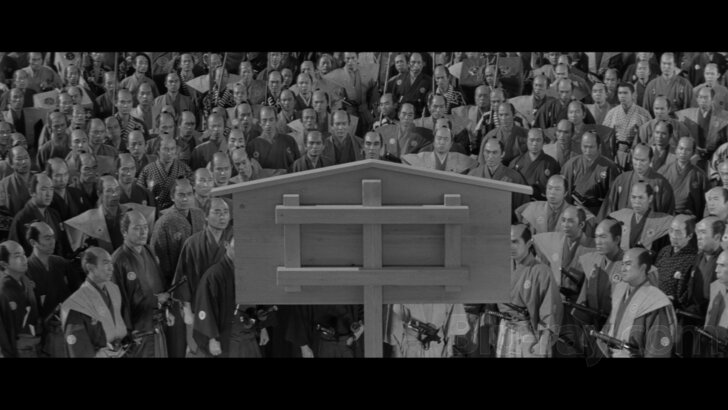
The release introduces a new 4K restoration of Sanjuro, which is included in this set. In native 4K, the 4K restoration cannot be viewed with Dolby Vision or HDR grades.
The following text appears inside the booklet included with this release:
"The 4K restoration presented on the 4K Blu-ray was created from the 35mm original camera negative. The original 3.0 Perspecta soundtrack was remastered from the 35mm original soundtrack negative by Tokyo Laboratory Ltd. The original monaural soundtrack was remastered from the 35mm optical track by the Criterion Collection."
Please note that all screencaptures included with this article are taken from the 4K Blu-ray and downscaled to 1080p. Therefore, they do not accurately reflect the quality of the content on the 4K Blu-ray.
Sanjuro made its high-definition debut at the same time Yojimbo did, which was in 2010. The original release of Sanjuro is the only other release of it that I have in my library.
The 4K makeover of Sanjuro is every bit as impressive as the one that was prepared for Yojimbo. The entire film looks very healthy now and boasts visuals with undeniably improved delineation, clarity, and depth. Also, I would like to specifically mention something that was an unmissable weakness on the previous presentation but is eliminated here. On the previous presentation, there are areas with mild background flicker, which on a bigger screen makes some visuals appear even more dated than they are. On the 4K makeover, the same areas look very stable and even. As a result, not only these areas, but the entire film produce visuals consistent fluidity is very, very attractive. On a big screen, this is one of the most dramatic improvements. Obviously, this 4K makeover is again sourced from superior elements and finalized with superior technology, so once again there is more visual information. Darker areas, for instance, reveal plenty of better balanced shadow nuances, which strengthen clarity and depth. There are no traces of any compromising digital corrections.
Sanjuro 4K Blu-ray Movie, Audio Quality 
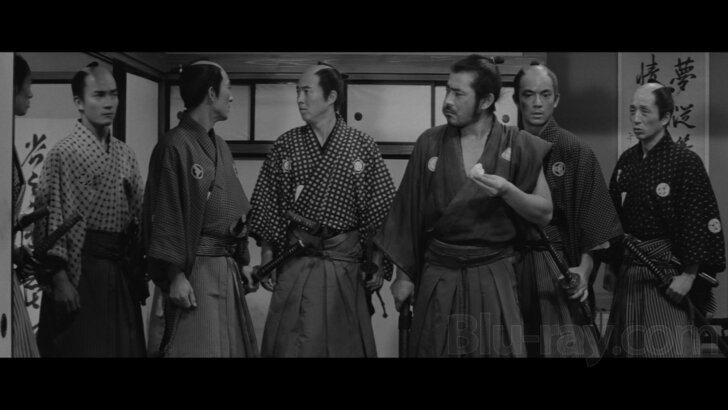
There are two standard audio tracks on this release: Japanese LPCM 1.0 and Japanese DTS-HD Master Audio 3.0 (which your player will display as a 5.1 track). Optional English subtitles are provided for the main feature. When turned on, they appear inside the image frame.
When viewing Sanjuro, I like to use the Mono track again. It is not because I dislike the 3.0 track. It is as effective as the one that was created for Yojimbo, but I do not think that the Mono track underperforms in any meaningful ways. Its most obvious dynamic limitations are inherited, and their effects are not eliminated on the 3.0 track. For example, on both tracks, the upper registers can appear a bit uneven at times.
Sanjuro 4K Blu-ray Movie, Special Features and Extras 
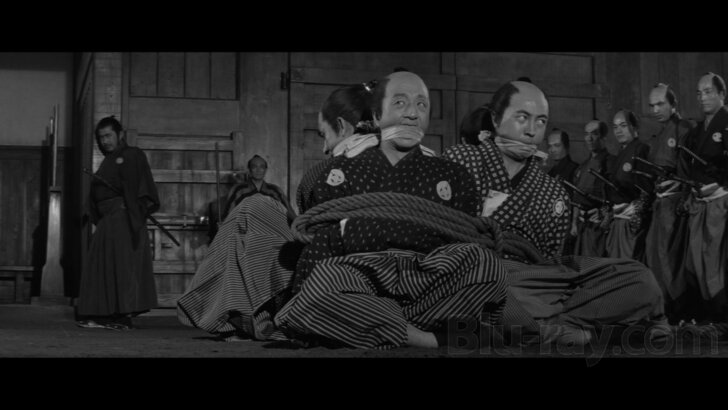
4K BLU-RAY DISC
- Commentary - this archival audio commentary was recorded by film historian Stephen Prince, author of The Warrior's Camera: The Cinema of Akira Kurosawa, exclusively for the Criterion Collection in 2006.
- Commentary - this archival audio commentary was recorded by film historian Stephen Prince, author of The Warrior's Camera: The Cinema of Akira Kurosawa, exclusively for the Criterion Collection in 2006.
- Akira Kurosawa: It Is Wonderful to Create - an archival documentary about the making of Sanjuro, part of the Toho Masterworks series Akira Kurosawa: It Is Wonderful to Create. Included in it are clips from interviews with Akira Kurosawa, actor Tatsuya Nakadai, production designer Yoshiro Muraki, and cinematographer Takao Saito, among others. In Japanese, with optional English subtitles. (35 min).
- Theatrical Trailer - presented here is a vintage theatrical trailer for Sanjuro. In Japanese, with optional English subtitles. (3 min).
- Teaser - presented here is a vintage teaser trailer for Sanjuro. In Japanese, with optional English subtitles. (1 min).
- Stills Gallery - a collection of stills from the filming of Sanjuro.
- Booklet - an illustrated booklet featuring a new essay by film critic Michael Sragow and comments from Akira Kurosawa and his cast and crew, as well as technical credits.
Sanjuro 4K Blu-ray Movie, Overall Score and Recommendation 
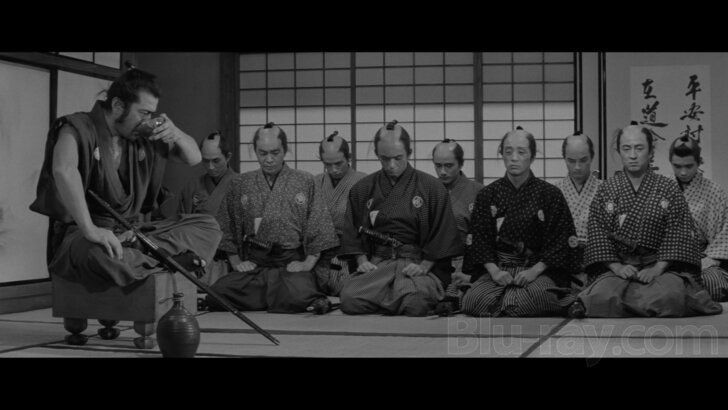
Yojimbo and Sanjuro are the two Akira Kurosawa films that I have revisited the most over the years. Toshir˘ Mifune is sensational in both, and I just really like how they are shot. Both films have been recently restored in 4K and will soon be available on 4K Blu-ray. Like Yojimbo, Sanjuro looks glorious now, the best it ever has. VERY HIGHLY RECOMMENDED.
Similar titles
Similar titles you might also like
(Still not reliable for this title)

Yojimbo
用心棒 / Y˘jinb˘
1961

High and Low 4K
天国と地獄 / Tengoku to jigoku
1963

Seven Samurai 4K
七人の侍 / Shichinin no samurai
1954

Throne of Blood
蜘蛛巣城 / Kumonosu-j˘
1957

Rashomon
羅生門 / Rash˘mon
1950

The Sword of Doom
大菩薩峠 / Dai-bosatsu t˘ge
1966

Lady Snowblood
修羅雪姫 / Shurayukihime
1973

Harakiri
切腹 / Seppuku
1962

Lone Wolf and Cub: White Heaven in Hell
子連れ狼 地獄へ行くぞ!大五郎 / Kozure ďkami: Jigoku e ikuzo! Daigor˘
1974

Lone Wolf and Cub: Baby Cart at the River Styx
子連れ狼 三途の川の乳母車 / Kozure ďkami: Sanzu no kawa no ubaguruma
1972

Le Cercle Rouge 4K
Uncut Version | includes remastered BD
1970

Lone Wolf and Cub: Sword of Vengeance
子連れ狼 子を貸し腕貸しつかまつる / Kozure ďkami: Ko wo kashi ude kashi tsukamatsuru
1972

Lady Snowblood 2: Love Song of Vengeance
修羅雪姫 怨み恋歌 / Shurayuki-hime: Urami koiuta
1974

Revanche
2008

Zatoichi in Desperation
新座頭市物語・折れた杖 / Shin Zat˘ichi monogatari: Oreta tsue
1972

Zatoichi at Large
座頭市御用旅 / Zat˘ichi goy˘-tabi
1972

Zatoichi the Outlaw
座頭市牢破り / Zat˘ichi r˘yaburi
1967

Zatoichi Goes to the Fire Festival
座頭市あばれ火祭り / Zat˘ichi abare-himatsuri
1970

Zatoichi Challenged
座頭市血煙り街道 / Zat˘ichi chikemuri kaid˘
1967

Samurai II: Duel at Ichijoji Temple
続宮本武蔵 一乗寺の決闘 / Zoku Miyamoto Musashi: Ichij˘ji no kett˘
1955
